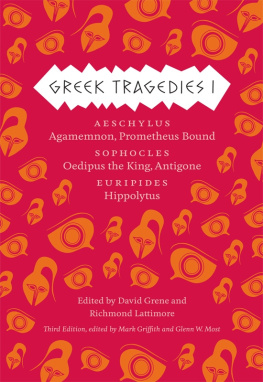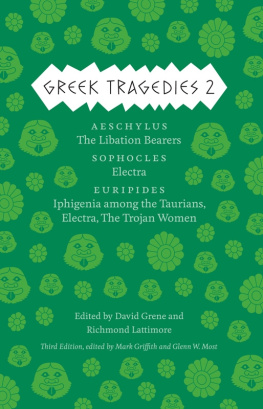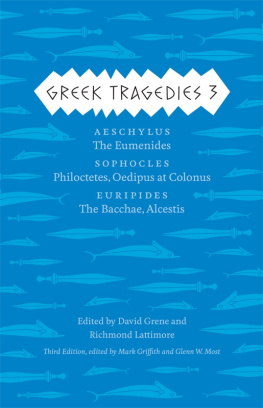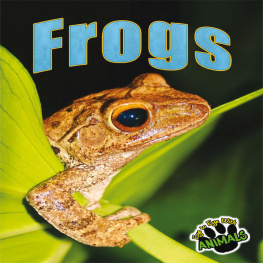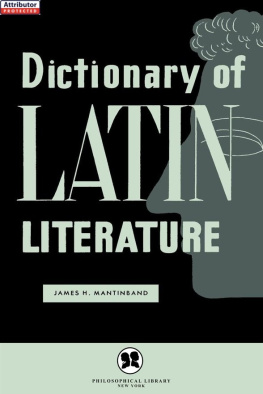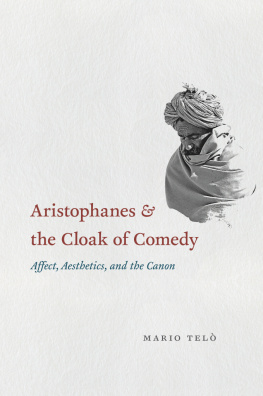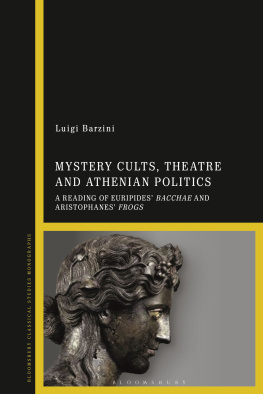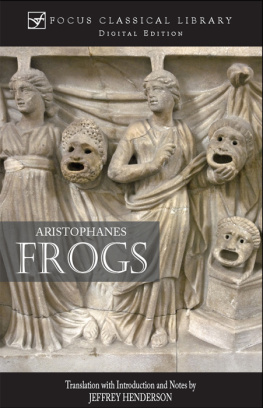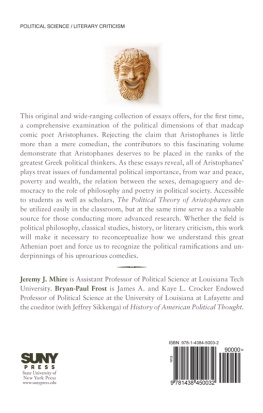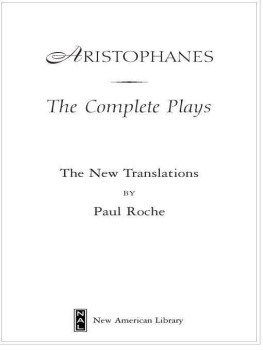ARISTOPHANES Frogs
OXFORD APPROACHES TO
CLASSICAL LITERATURE
SERIES EDITORS
Kathleen Coleman and Richard Rutherford
OVIDS Metamorphoses
ELAINE FANTHAM
PLATOS Symposium
RICHARD HUNTER
CAESARS Civil War
WILLIAM W. BATSTONE
CYNTHIA DAMON
POLYBIUS Histories
BRIAN C. McGING
TACITUS Annals
RONALD MELLOR
XENOPHONS Anabasis, OR The Expedition of Cyrus
MICHAEL A. FLOWER
ARISTOPHANES Frogs
MARK GRIFFITH
ARISTOPHANES Frogs
MARK GRIFFITH


Oxford University Press publishes works that further
Oxford Universitys objective of excellence in research,
scholarship, and education.
Oxford New York
Auckland Cape Town Dar es Salaam Hong Kong Karachi
Kuala Lumpur Madrid Melbourne Mexico City Nairobi
New Delhi Shanghai Taipei Toronto
With offices in
Argentina Austria Brazil Chile Czech Republic France Greece
Guatemala Hungary Italy Japan Poland Portugal Singapore
South Korea Switzerland Thailand Turkey Ukraine Vietnam
Copyright 2013 by Oxford University Press
Published by Oxford University Press
198 Madison Avenue, New York, New York 10016
www.oup.com
Oxford is a registered trademark of Oxford University Press
All rights reserved. No part of this publication may be reproduced, stored in a retrieval system, or transmitted, in any form or by any means, electronic, mechanical, photocopying, recording, or otherwise, without the prior permission of Oxford University Press.
Library of Congress Cataloging-in-Publication Data
Griffith, Mark, PhD
Aristophanes Frogs / Mark Griffith.
pages. cm.(Oxford approaches to classical literature)
ISBN 978-0-19-532773-1ISBN 978-0-19-532772-4 1. Aristophanes. Frogs. I. Title. II. Series:
Oxford approaches to classical literature.
PA3875.R3G75 2012
882.01dc23 2012008786
1 3 5 7 9 8 6 4 2
Printed in the United States of America
on acid-free paper
T he late twentieth and early twenty-first centuries have seen a massive expansion in courses dealing with ancient civilization and, in particular, the culture and literature of the Greek and Roman world. Never has there been such a flood of good translations available: Oxfords own World Classics, the Penguin Classics, the Hackett Library, and other series offer the English-speaking reader access to the masterpieces of classical literature from Homer to Augustine. The reader may, however, need more guidance in the interpretation and understanding of these works than can usually be provided in the relatively short introduction that prefaces a work in translation. There is a need for studies of individual works that will provide a clear, lively, and reliable account based on the most up-to-date scholarship without dwelling on the minutiae that are likely to distract or confuse the reader.
It is to meet this need that the present series has been devised. The title Oxford Approaches to Classical Literature deliberately puts the emphasis on the literary works themselves. The volumes in this series will each be concerned with a single work (with the exception of cases where a book or larger collection of poems is treated as one work). These are neither biographies nor accounts of literary movements or schools. Nor are they books devoted to the total oeuvre of one author: our first volumes consider Ovids Metamorphoses and Platos Symposium, not the works of Ovid or Plato as a whole. This is, however, a question of emphasis, and not a straitjacket: biographical issues, literary and cultural background, and related works by the same author are discussed where they are obviously relevant. Series authors have also been encouraged to consider the influence and legacy of the works in question. As the editors of this series, we intend these volumes to be accessible to the reader who is encountering the relevant work for the first time; but we also intend that each volume should do more than simply provide the basic facts, dates, and summaries that handbooks generally supply. We would like these books to be essays in criticism and interpretation that will do justice to the subtlety and complexity of the works under discussion. With this in mind, we have invited leading scholars to offer personal assessments and appreciations of their chosen works, anchored within the mainstream of classical scholarship. We have thought it particularly important that our authors be allowed to set their own agendas and to speak in their own voices rather than repeating the ides reues of conventional wisdom in neutral tones.
The title Oxford Approaches to Classical Literature has been chosen simply because the series is published by Oxford University Press, USA; it in no way implies a party line, either Oxonian or any other. We believe that different approaches are suited to different texts, and we expect each volume to have its own distinctive character. Advanced critical theory is neither compulsory nor excluded; what matters is whether it can be made to illuminate the text in question. The authors have been encouraged to avoid obscurity and jargon, bearing in mind the needs of the general reader; but, when important critical or narratological issues arise, they are presented to the reader as lucidly as possible.
This series was originally conceived by Professor Charles Segal, an inspiring scholar and teacher whose intellectual energy and range of interests were matched by a humility and generosity of spirit. Although he was involved in the commissioning of a number of volumes, he did notalaslive to see any of them published. The series is intended to convey something of the excitement and pleasure to be derived from reading the extraordinarily rich and varied literature of Greco-Roman antiquity. We hope that these volumes will form a worthy monument to a dedicated classical scholar who was committed to enabling the ancient texts to speak to the widest possible audience in the contemporary world.
Kathleen Coleman, Harvard University
Richard Rutherford, Christ Church, Oxford
A lmost every aspect of the classical Greek experience of life comes into play in Aristophanes incomparable comedy, The Frogs: war, politics, labor, mythology, aesthetics, the arts, religion, death and salvation, freedom and slavery, sex and gender andof coursehumor of all kinds. It is impossible for one person to do full justice to this fantastic play in one short book, though it has been a hugely enjoyable challenge to make the attempt.
My debt to the scholarship and ideas of others is very extensive, much too great to describe here; and I regret that the constraints of this series forbid detailed references and critical discussion. The Suggestions for Further Reading provided after each chapter, and the consolidated Bibliography at the end, represent just the tips of several large icebergs. I hope that the many Aristophanicand otherscholars whose work is not mentioned in the bibliography but who have nonetheless helped me get closer to an understanding of The Frogs will recognize the places where they have been helpful and will forgive me for not citing them explicitly; and I hope that those with whose positions I have disagreed will forgive me too for not engaging in more direct dialogue with their views. It goes against the grain for me to write briefly and dogmatically; but in this case it was sometimes necessary.
In particular, I should like to thank the following individuals for advice, corrections, and help of various kinds: Zachary Biles, the late Crawford Greenewalt Jr., Foivos Karachalios, Sarah Pirovitz, Laurialan Reitzammer, Daniel Walin, and all the Berkeley students who took my class on
Next page

